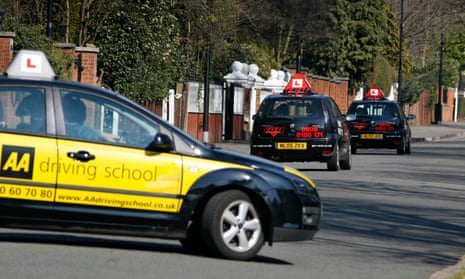Learner drivers are finally going to be allowed to have lessons on motorways after a government consultation, which itself followed years of pressure from road safety groups over what they argued was a long-running safety omission.
While motorways are the safest type of road to travel on, the bar on learners using them meant they tended to be tackled for the first time by newly qualified drivers who would often be alone in the car. Post-test motorway courses are available to teach the specific skills needed for driving on them, but government research found that only a very small percentage of new drivers were taking these.
From 2018, a change to the law will allow learners to drive on motorways, but only with a qualified driving instructor in a dual-control car, the transport secretary, Chris Grayling, said. The change will apply only to cars, not to motorbikes, and only in England, Wales and Scotland.
“Younger drivers are up to seven times more likely to be killed or seriously injured compared with drivers over 25, and lack of experience is an important factor,” Grayling said.
“Allowing learners to drive on motorways in a supportive environment will help them develop a practical understanding of how to use motorways safely before driving independently.”
One of the factors influencing the law change was evidence showing that very few newly qualified drivers were taking courses instructing them on how to use motorways safely. Government figures showed that only about 3% of new drivers take “Pass Plus”, the six-hour post-test course that includes being shown good practice on motorways.
While driving instructors also often offer motorway lessons, the Department for Transport said uptake seemed very low.
At the end of last year the government launched a formal consultation, asking both whether the change should happen and, if so, how it could be best implemented. The response was positive, with the Approved Driving Instructors Association saying it had “been part of a campaign for this change for many years”. The Royal Society for the Prevention of Accidents also supported it.
The RAC welcomed Grayling’s decision. “While motorways are statistically our safest roads, it can be daunting using them for the first time after passing the driving test,” said Pete Williams from the organisation.
“Giving learners the option to gain valuable experience on our fastest and busiest roads should further improve safety and enhance the confidence of new drivers.”
Jasmine Halstead, head of learning and development for British School of Motoring, said: “If learners aren’t allowed to practise on motorways under supervision then some will avoid motorways, and others will use motorways incorrectly when they have passed their test.
“Hence it is great news for road safety that learners will be able to drive on motorways under supervision.”

Comments (…)
Sign in or create your Guardian account to join the discussion